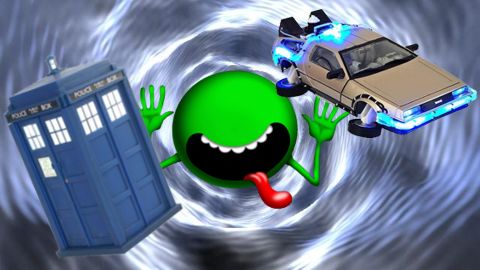
Time is often referred to as the fourth dimension of the space-time continuum. Unlike the three dimensions of space that we keep trying (with varying degrees of success) to recreate in entertainment media, it is often likened to a straight line. The chagrin of would-be time travelers everywhere, it also appears to move in only one direction. General Relativity may allow for time to pass more quickly or slowly under certain conditions, but it always marches to the inexorable end.
But what if we could break “the arrow of time”, and turn it back on itself. What would that mean? How would it be done? And what would the consequences be?
Many geek interests have tackled this subject, and more than a few have seeped into the minds of the 18-35 general audience. Come on a time journey with us…
Practical time travel may involve breaking the “light barrier”; as an object accelerates towards the speed of light, time appears to move inversely slowly to your speed. If you could reach the speed of light, you could move through space without any time seeming to pass for you at all. And if you could go faster…?
We can’t. The laws of physics seem to prevent it so that you can get near the speed of light, but never actually get there. The result? Time still moves forward for you, but VERY slowly, as the universe around you appears to be aging very, very quickly.
But what if we could break the time barrier? There is a tresure trove of geek lore that describes what could happen…
Whatever Happened, Happened: LOST
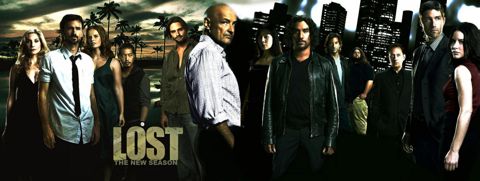
Linear, one-dimensional time is often likened to a river: though we might struggle against it, its flow is overpowering. In the end, it takes us where it wills. Such a model seems to preclude free will, since we are just along for the ride.
Taking the river analogy further, there may be little wakes and eddies where things don’t always flow in a straight line. Sometimes the water might flow back on itself before continuing onward. What would that kind of time look like?
My long-time favorite example of this idea was the story of the first Terminator movie, but that was recently usurped by LOST and its fantastic fifth season, where the castaways find themselves as part of the Dharma Initiative in the 1970s. “Extreme electromagnetic events” have caused some freaky weirdness previously on the show, but the actions of Bejamin Linus at the end of the fourth season seemed to “unstick” the island from the regular flow of time.
Initially afraid of altering the past, the Losties try to lay low, only to find that they aren’t changing anything so much as fulfilling what appear to be predefined roles. For instance: Ben is a huge jerk in the relative future, so Sayid gets the idea that killing a prepubescent Ben on the island would prevent them from ever having to deal with his jerk face. Ultimately, Sayid’s incredibly questionable actions only result in a serious injury, ultimately made non-fatal by the powers of the island. The only catch is that healing Ben will “change” him. This change causes Ben to begin the same slow descent into jerkhood that Sayid was trying to prevent in the first place.
Even in instances where the future is known, Jack and crew still make the decisions that will bring the time loop to completion, spurred by the false hope that they will be able to change their own fate — despite everything they’ve experienced to the contrary.
This is the definition of a closed time-like curve: effects that have no preceding cause, or a chain of cause and effect that has no discernable beginning or end — such as Locke’s compass that gets handed around from past, present, and future. These are theoretically-possible constructs of our actual space-time, and this particular bit of science fiction spent 17 episodes exploring every avenue of what that might mean.
Grandfather Paradox: Back to the Future
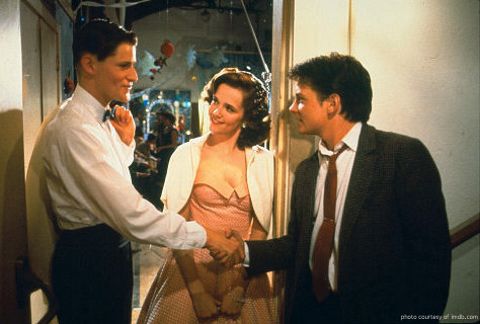
An alternate theory is that the past is not immutable, and your presense there can cause drastic changes the further back you go. This is known as the Butterfly Effect (just in case you were wondering why Ashton Kucher film had that particular title), although the concept has the same problems. Just as a butterfly can’t cause a hurricane on the other side of the world (or stepping on a butterfly probably WON’T cause the English language to resemble a jumbled mess of characters), small changes to the past will most likely only cause equally-modest changes in the present — if any at all. But the effects can certainly be personal, especially if you’re talking about your own parentage.
The most well-known example used against this model of time travel is the Grandfather paradox: if you go back in time and kill your grandfather before your father (or mother) is ever born, then you will never be born either. What happens then? If you’re never born, then you’re never able to go back in time to kill your own grandfather. Firmly alive, he sires your immediate predecessor, who then gives rise to you. Then, with access to time travel, you decide it’s a good idea to kill your grandfather…
In LOST’s example, even if you found yourself in such a situation, you would be thwarted in your attempt to change the past from what was known. For instance, you may succeed in killing the man you know as your grandfather (and, in fact, your own past may show that he was killed by an unknown assailant), but then it turns out that your actual progenitor was the milkman. Or, maybe, he’s YOU.
This example can be used to prove that time travel can’t exist, but the counter-example proves that time travel MUST exist in order for the chain of cause and effect to continue — although genetic degredation pretty much rules this out as even a thermodynamic possibility, much less a temporal one. Besides, your grandma isn’t even hot.
That didn’t stop Marty McFly from skidding back into the 1950s in his super-stylish Delorean to spoil his parents’ first (super-creepy) meeting. Mom instead tried to mack on her son-to-be, because Marty’s dad is pretty much a total dweeb, and, well, she WAS hot. So I guess it was okay.
However, the effects of Marty’s actions began to catch up with him; like a ripple in a pond, his interference slowly making its way into the future, and threatening his very existence. Eventually, Marty righted his wrongs, only to find himself back in 1985 in another Marty’s life.
But this is almost as silly as the Grandfather conceit, as we’ll see next.
The Multiverse: Sliders
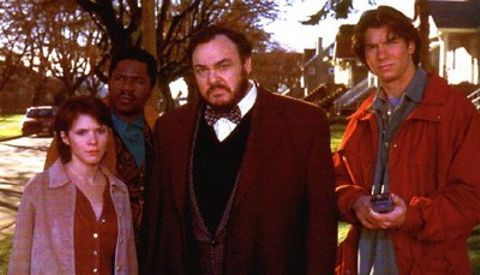
The way to side-step the grandfather paradox is to assume that, from the perspective of the time traveler, time can branch off from its “original” path, which Doc very deliberately spelled out in tree diagram form once he and Marty found themselves in a 1985 that was quite drastically different from the one they both knew.
Under this premise, moving into the past isn’t so much going backwards along a straight line as it is a “jump” to a parallel track at the same point — the only difference being that an older version of the traveler existed in his or own past. Except it’s not your own past, which means wreaking havoc on this reality will have no effect on you whatsoever. Under these rules, Marty would not disappear, even if he did think his mom was super-hot. Traveling forward along this track will not return you to your own “present”; you are forever stuck in this new reality, and no amount of foward-and-back time travel can return you home.
A show that handles this idea much better is Terminator: The Sarah Connor Chronicles, where every jump into the past alters the future that much more. When Derek Reese’s super-hot lover follows him back from the future, he quickly realizes that they didn’t share the same past, and that his actions altered the future in such a way that her version of him had actually died before he was ever able to time travel.
You have now entered a multiverse of near-infinite worlds, each slightly different from the others because of some little change in the past that is different from the world you know. This is the entire premise of the much-maligned Sliders. Sure, Marty could wreak havoc in his own little corner of space-time, but only someone like Quinn could experience a version where he’s played by Eric Stolz. (Well, Quinn and Olivia Dunham…)
This model doesn’t necessarily preclude that you can go home and not know it (which happened once or twice on the show, for ridiculous reasons), but because you can’t take into account of all the possible variables; you can never be sure it was the reality you left, and not just one that was strikingly similar. Some of these worlds barely share a past at all, as a few have different physical laws and a slower forward motion of time — but that’s jumping into a dimension that’s beyond the scope of this article!
Wibbly-Wobbly, Timey-Wimey: Doctor Who

Bringing it all together again onto one universe, but following most of the same rules as Sliders or TSCC, the reality of Doctor Who has just one universe (well, most of the time), that is always in flux, and — thanks to the existence of at-will time travel — constantly being rewritten.
In Doctor Who, the caveat for this is that there are fixed points that are so important, so crucial, that all possible timelines coalesce around them. Attempts to change specific events may be successful in the minor details, but events flow around those changes to have more or less the same outcome. We’re back to the course-correcting river again.
The Doctor, then, has memories of entire timelines that never were. Heck, the universe has even been destroyed a time or two on his watch, so the very notion of time being fixed in any sense is suddenly suspect. But the new series tends to play with these possibilites much more than in the old days — especially with new show-runner Stephen Moffat now at the figurative helm. (Err, TARDIS console?)
General Sort of Mish Mash: Douglas Adams
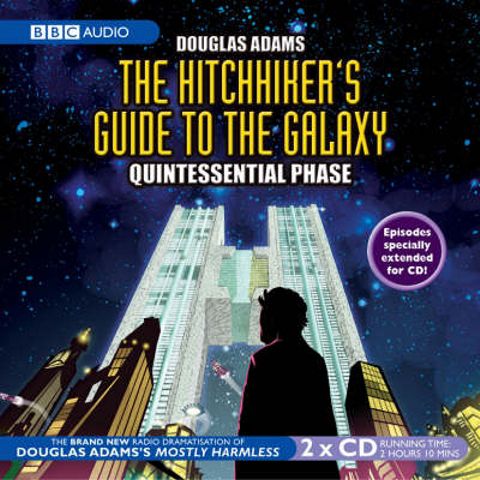
Take away the fixed points in space-time, and what you have is a convoluted volume of time where anything that can happens will/does/did happen — it’s only how you navigate through this probability minefield — which appears linear and unidirectional to (most of) us — that determines your past, present and future.
If it sounds at all familiar, that’s because it was a theory proferred by Douglas Adams in his final (completed) Hitchhiker’s Guide to the Galaxy novel “Mostly Harmless”.
For three novels, the destruction of the Earth by the Vogon constructor fleet was an irrefutable fact — certainly for Arthur Dent, but for the rest of the universe as well. Except by the time we get to So Long and Thanks for all the Fish, we discover that Earth is still there. Mostly. Sort of. Is it a copy, like in the ending of the movie adaptation? Maybe you want to believe that, but the truth is even weirder: it’s AN Earth, just not the one that was most-assuredly destroyed.
In the Hitchhiker’s Guide to the Galaxy, Earth is in a “plural zone” of space, which means it’s “intermittent along its probability axis”. (Think back to alternate-1985). That also means that anyone FROM there needs to be really careful gallivanting across the rest of the less-intermittent galaxy, lest you find yourself in a situation where you no longer exist.
But that’s somewhat beside the point. The most interesting feature of such a universe is the idea of reverse temporal engineering. If everything that can ever happen will and does happen, then that means you can experience space-time as a set of eerie coincidences that alway seems to work in your favor. If you need a lift off of a planet, rather than wait and hope for decades on end that you’ll be rescued, just use your command of the full knowledge of space-time to misplace a piece of luggage that a rich traveler might go back for. Bam, instant ride! Or perhaps you explode a star millions of years ago so that the resulting neutrino burst temporarily shorts out another starship’s drive so that it won’t leave as scheduled, even though you would have missed it normally. Never mind the super-peaceful sentient race that would have evolved in that exploded star’s system — you were late for dinner!
That’s a wrap
We may never find the secret to traveling back in time or visiting other worlds, but we’ll certainly keep moving forward.
And now I’m going to go back to three days ago and write this article.